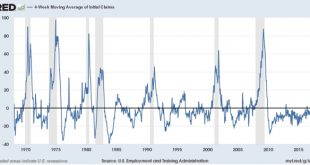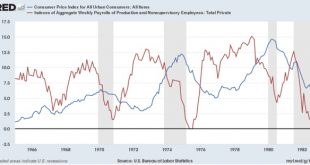I haven’t been bothering to comment on initial jobless claims reports lately, for the simple fact that every week it’s the same story: they’re good! In fact, the initial jobless claims reports are probably the single most positive aspect of the entire economic expansion. For all intents and purposes, nobody is being laid off! For initial jobless claims even to be giving a “caution signal” about the economy, I would need the YoY comparison to...
Read More »What went wrong in Capetown?
by David Zetland (reposted from Aguanomics) What went wrong in Capetown? I asked that question of Mike Muller, who has been working on water issues there for decades. He referred me to this op/ed he wrote and — more important — the inadequate response from a local city councillor. [Tl;dr: Failure to invest against risk from “inadequate rain” — a problem that climate change will exacerbate.] Taps are running dry — and we are all to blame Water supply...
Read More »A Kennedy-Reagan-Trump Fiscal Policy?
A Kennedy-Reagan-Trump Fiscal Policy? Heather Long reports that the White House economists have no clue about the history of U.S. fiscal policy: President Trump’s policies are driving an economic turnaround that puts him in the company of transformative presidents such as John F. Kennedy and Ronald Reagan, White House economists said Wednesday as they unveiled their first “Economic Report of the President.” The report presents a highly optimistic view of...
Read More »Divide and Rule
Divide and Rule There was a time, one I can remember from when I was growing up (the 1950s and 60s), when being a liberal meant you wanted certain rights and benefits for everyone, at least ostensibly. We had Social Security because everyone should have a basic pension when they retire, and all disabled people need to be cared for. Freedom of speech was for everyone, even those horrible Nazis in Skokie. Liberals wanted national health insurance so...
Read More »Paying for Health Care Over Time
Paying for Health Care Over Time Simon Wren Lewis illustrates the long-run government budget constraint with this tale: There are many reasons why, outside of a recession, deficits that, if sustained, would steadily increase the debt to GDP ratio may be bad for the economy, but let me give the most obvious here. For a given level of government spending, interest on debt has to come out of taxes. The higher the debt, the higher the taxes. That is a...
Read More »A Critical Review of Jeffrey Miron’s Call to Slash Entitlements
A Critical Review of Jeffrey Miron’s Call to Slash Entitlements I accused John Cochrane of incoherent babbling on the Federal deficit issue noting his update where he flip flopped: He went from fiscal policy being sober to we are in dire straights just like that! Oh my the sky is falling. We have to take away those Social Security benefits that my generation have been paying into for 35 years. We cannot afford Federal health care spending. After all...
Read More »Competition Is for Losers
The Wall St. Journal quoted Peter Thiel’s business plans. It is mostly behind a paywall. By Peter Thiel Sept. 12, 2014 11:25 a.m. ET What valuable company is nobody building? This question is harder than it looks, because your company could create a lot of value without becoming very valuable itself. Creating value isn’t enough—you also need to capture some of the value you create. New Republic points us to the politics of Democrats...
Read More »All Economists Are Bastards — Except Us
All Economists Are Bastards — Except Us Peter Frase has a very interesting post up about the role of popular culture in legitimizing the police. Frase recounted a forum he attended with Alex Vitale talking about his book, The End of Policing. In response to a question about why people believe that the function of policing is to maintain peace in the liberal order when its actual practice and history suggest otherwise, Vitale cited television cop shows...
Read More »Fiscal Stability or Dire Straights: John Cochrane’s Latest Rant
Fiscal Stability or Dire Straights: John Cochrane’s Latest Rant At times John Cochrane babbles on incoherently on what should be a straight forward issue. This post is one example: Once you net out interest costs, it is interesting how sober US fiscal policy actually has been over the years. In economic good times, we run primary surpluses. The impression that the US is always running deficits is primarily because of interest costs. Even the notorious...
Read More »Why I’m worried about the decline in real wages
Why I’m worried about the decline in real wages This is a follow-up to my post yesterday concerning the decline in real average and aggregate wages. Why should the data from just one month cause me to warn that “This is Bad?” To show you, let’s decompose the data into CPI and nominal aggregate wages, shown in the below two graphs, the first of which covers the inflationary era of the 1960s and 1970s, and the second covers the disinflationary era since:...
Read More » Heterodox
Heterodox


